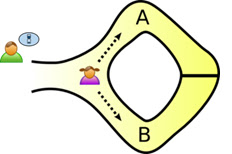Age Verification and Aadhar
On the Internet, there is pretty much no way for a site to know a person’s age. The most obvious kind of sites where this becomes a problem are pornographic sites. Of course, there are other sites which trick and manipulate children on the Internet in other ways. How does one identify and protect minors on the Net?
To try and address
this, California passed a law in 2022 making it mandatory for sites to have
checks in place to avoid exposing under-age children to certain kinds of
content. You’d think it would be hard to argue against this, right? But this
was America. A lawsuit was filed against the law, a court granted an
injunction. On what grounds? Free speech rights! (In the US, that one is baked
into the constitution and many there hold it almost sacred).
Rahul Matthan
wrote an interesting post on the matter, contrasting things with
India. While the concern of what kids can access and how they are manipulated
by web sites holds in India, there are two major differences. (1) First,
while our constitution also gives freedom of speech and expression, it also
includes the vague term “reasonable restrictions”. Matthan says that while this
phrase can be misused, it also means that an equivalent law (to what California
passed) cannot be struck down in India as unconstitutional. (2) Second,
unlike America which has no government issued digital ID system, India has one
– Aadhar.
Many in India have
(rightly) argued that we don’t want every random website to be able to have
access to Aadhar data based on the legitimate need (or pretence) of needing to
know a person’s age, explains Matthan. How do we address this valid concern?
In principle, we
need a way to be able to answer the question (Minor or not?) in a way that does
not provide any other information. In cryptography, they call this ZKP (Zero
Knowledge Proof). It is a way to convince someone something is true without
giving any info other than the fact that the statement is true! This sounds
impossible instinctively – surely, to prove/convince someone, you need to show
something more than just a declaration of it being true. A few examples of how
a ZKP can work in principle will help.
The red card
proof. Player X draws a card from a deck and announces she has a red card.
Is it possible to convince player Y this is true without conveying any other
information? Enter the ZKP. X takes the entire deck (other than her card) and
puts face up each black card for Y to see. Since a deck has 26 red and
26 black cards, if X can show 26 black cards to Y, then it implies that X had a
red card. Thus proved, without Y having any idea which particular red
card X has.
Take the Ali Baba cave. Peggy says she knows the password to open a door at the back of the cave (the flat line in the pic).
Victor doesn’t
know whether to believe her. Peggy is not willing to tell him the password to
check for himself. Is there any way for Peggy to prove she knows the password
in such a scenario? Yes, ZKP to the rescue. Here’s how it works. Peggy goes in
via any one path A or B (Victor won’t know which). Victor then gets to tell
Peggy via which path she should come out of – A or B. If Peggy went via A (50%
chance), and Victor asks her to come out via A, well, she wouldn’t have used
the password. But if Victor said B, then the only way Peggy could do that was
if she knew the password. Do this one time, and it only gives Victor 50%
confidence Peggy really knew the password. But repeat it a dozen times and if
each time Peggy is able to come via the path Victor called for, then odds that
she was just lucky are 1 in 212 or 1 in 4096, a very tiny and almost
impossible occurrence. In this example, ZKP doesn’t give 100% confidence, but
with enough trials, the confidence can reach as close to 100% as one wants for
practical purposes.
That then is the idea
of how ZKP can work. ZKP proofs can be entirely mathematical and implemented
via cryptographic algorithms.
Back to the Minor
or not problem and how India is perfectly placed to answer this. Since Aadhar
is a digital government issued ID system, it can incorporate a ZKP style algorithm
to answer a site (Minor or not) without giving any other info about the
individual. Which is why Matthan says:
“Content
moderation is a global challenge… No country will be able to do this
effectively unless it puts in place an effective age-verification mechanism…
(India) offers an answer that not only preserves privacy, but ensures that
content restrictions can be devised to apply only to those in need of
protection.”
And ends with:
“Sometimes, solutions lie not in the laws we enact, but in the infrastructure we erect.”

Comments
Post a Comment